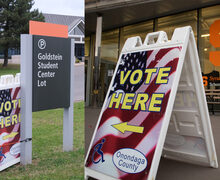Vonn Read turned his knack for X’s and O’s into a 10-book series
Chloe Perline | Asst. Illustration Editor
Vonn Read has accumulated nearly 20,000 plays, many of which he has included in his 10-playbook series “The Basketball Encyclopedia of Plays.”
Get the latest Syracuse news delivered right to your inbox.
Subscribe to our sports newsletter here.
When Tom Lewis needed plays, he knew who to call.
Then the head coach at JSerra Catholic (Calif.) High School, Lewis wanted zone offense plays. So he dialed his longtime friend and former colleague Vonn Read, who he coached with in the WNBA.
Read went through his files and sent Lewis 50 plays that he knew would be perfect for him. Lewis immediately called back, amazed at the in-depth nature of Read’s files. But to Read they were just ordinary plays, a small margin of the 1,000 plays he had in his files. So Lewis proposed an idea.
“I said, ‘You know what, you should write a book,’” Lewis said. “I would buy it if you wrote a book of all this stuff.”
So Read thought about the idea, and given the number of plays he had, he took Lewis up on the suggestion.
It became the birth of Read’s 10-playbook series titled “The Basketball Encyclopedia of Plays.” After spending years as an NBA scout, coaching in college and the WNBA, Read has accumulated nearly 20,000 of his own plays and has carried that expertise into his first head coaching job at Syracuse.
“(Lewis) kind of inspired me a little bit with that comment,” Read said. “I said, ‘Well, maybe a couple people would buy it.’”
Lewis has bought over 100 basketball coaching books, but he said Read’s are the best of his collection, books he’s flipped through thousands of times. His trust in Read goes back to 2000, when the two of them coached together with the Phoenix Mercury.
While coaching the Mercury, Read also served as a video scout for the NBA’s Orlando Magic. He wrote down every play he came across, adding to his overall file.
Read’s ability to notice plays is a reason why Lewis trusts his basketball perspective. The two often talk about basketball for nearly four hours. Read’s experience with collecting plays from each NBA team, such as specials, zones and fast breaks are why Lewis called him when he needed plays the most.
“I call them my basketball bibles,” Lewis said. “I evaluate my personnel — what I have and what those strengths are — and … I find plays or specials or offense that matches the personnel that I have.”
But well before Read became a professional coach and scout, he started drawing his own plays at 12 years old. Read recorded whatever game he found on TV on VHS tapes and re-watched them, studying and dissecting the plays each team used.
“I could tell you when (teams) dribbled the ball two times this way, what play they were going to run right off the bat. I just knew everything that they were going to do,” Read said.
Read enjoyed basketball from the “X’s and O’s” standpoint much more than actually playing the sport, always knowing he wanted to become a coach or a sports agent in the future.

Vonn Read began compiling plays when he was 12 years old. He turned years of expertise as an NBA scout and a college coach into a vast collection of plays that he released in playbooks. Syracuse Athletics
In 1997, Read approached then-Spelman College women’s basketball head coach, LaVon Mercer, and asked if he needed any help. Shortly after, Read joined Spelman’s staff as a volunteer assistant coach, mainly reviewing tapes and recording stats.
Mercer and Read collaborated on incorporating the European style of basketball — one where they would encourage 3-point shot attempts by working the ball to the wings off the fast break. Mercer remembered Read running a 1-4 “triangle” offense, something that was similar to the “Russian weave” offense. Even though Mercer had no idea Read kept thousands of plays at the time, it was obvious to him that Read had drawn influence from a variety of coaches.
“He was a connoisseur of different coaches and sports around the world,” Mercer said. “We started doing things from, not just here in the States, but from around Europe and things of that nature.”
So Mercer wasn’t surprised at all when Read made the jump from then-Division II Spelman to a scouting job with the Magic. While at Spelman, Read also worked as an archivist and production assistant for the NBA on TNT, attending practices at night.
TNT was where Read made numerous basketball connections, including former Olympic gold medalist Cheryl Miller, who eventually hired him to his first professional coaching job with the Mercury, a decision based on a “gut feeling” she had regarding Read’s basketball knowledge, Lewis said.

Megan Thompson | Design Editor
Miller and Lewis often dubbed him “The Doctor” or even “The Nutty Professor” because of his passion for basketball, Lewis said. Unlike many coaches Lewis has worked with, Read’s desire to continue learning and studying different areas of the game makes him stand out. One summer, Read conducted a survey on teams from all over the country who ran different systems and broke down the advantages of having more possessions and more shots, Lewis remembered. The two had a nearly five-hour long conversation about it as Read shared every stat he gathered during his in-depth breakdown.
“He’s a genius,” Lewis said. “The guy is a flat out genius. Passion pours out of him talking about basketball.”
Now in his first head coaching season, and 10th at Syracuse, Read does not plan on continuing the book series, he said. His last playbook, “Platinum Edition,” was released in 2009 and was built off his repertoire of zone-based plays that made up a large portion of prior editions.
Still, many of those plays have found their way into Syracuse’s current schemes today. Even though Read has had to adjust his tactics based on his current personnel — such as implementing a 5-out motion offense — he has still trusted the zone and encouraged fast break opportunities.
“I don’t know who wouldn’t trust that,” guard Najé Murray said of Read’s knowledge. “He knows everything. I’ve never been around a coach who knows his X’s and O’s better than him. So I will always trust his strategy.”
Published on January 26, 2022 at 10:31 pm
Contact Alex: ahcirino@syr.edu






